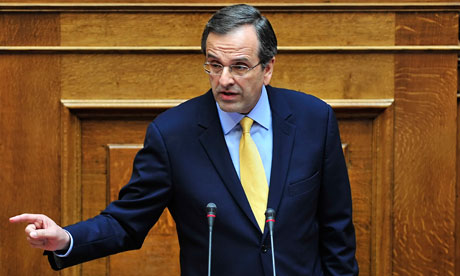Antonis Samaras, Harvard-trained economist and head of the main centre-right party, says the medicine is wrong for Greece
Helena Smith in Athens guardian.co.uk, Friday 5 August 2011 19.47 BST
Antonis Samaras, who once shared digs in the US with George Papandreou, has become an anti-establishment figure in Greece as well the EU. Photograph: Louisa Gouliamaki/AFP/Getty Images
In his ultra-modern office, seated behind an array of photographs autographed by the likes of Ted Kennedy and George Bush Snr, Antonis Samaras does not come across as a particularly anti-establishment figure.
But as president of Greece's main opposition, the centre-right New Democracy party, that is what he has become.
In Europe's epic battle to resolve the conundrum of Greece's crippling €350bn (£305bn) debt, the Harvard-trained economist has disagreed, fundamentally, with the "medicine" that has been meted out to the country.
"The medicine Greece has been given, doesn't work," he says, listing the barrage of tax increases, wage cuts and pension drops demanded by the "troika" (EU, ECB and IMF) in return for emergency aid.
"The austerity measures aren't working; the sacrifices that are being made aren't paying off. The treatment is simply so strong that there is a risk we will kill the economy before we kill the deficit."
Born into pedigree and privilege – just as George Papandreou, the socialist prime minister with whom he shared student digs in the US – the conservative leader has found himself sparring not only with his one-time close friend. Opposition to the "growth through austerity" formula that Greeks have been subjected to has also put Samaras at odds with other leaders in the centre-right European People's party, of which New Democracy is a member.
Since the crisis erupted 18 months ago, Angela Merkel, the German chancellor, José Manuel Barroso, the European commission president, and Silvio Berlusconi, the Italian prime minister, have all tried and failed to change his views.
But Samaras remains steadfast – and unrepentant.
The deficit-cutting measures pursued after Athens's €110 bailout last year, have, he insists, not only failed to solve Greece's spiralling debt but plunged it into the "biggest recession since the second world war".
Last month's sweeping plan to contain the crisis – hailed as a "historic decision" by Papandreou – was a mixed blessing, Samaras says, and more "mixed" than "blessing" at that. While offering the country much–needed breathing space by improving the terms of its debt repayment – lowering interest rates and extending the maturities of loans – the €109bn programme had done nothing to rekindle recovery.
"As long as the Greek economy keeps sinking in depression, it will not be able to service its debt, even under better repayment terms," he says. "Three months ago, Greece was provided another improvement of its debt repayment terms. It was 'good news' then, but not good enough because as the crisis has since worsened."
Despite appeals from both in and outside Greece New Democracy voted against a €28bn package of further spending cuts and tax increases last month, claiming it would push the country "one step" closer to default.
"The only rational thing is to change the policy mix," he says. "As Einstein himself said, the definition of absurdity is to follow the same solution and expect different answers. The official projection was that in the first semester of 2011 the deficit would drop by 4% compared to the first semester of 2010. Instead, it went up by 27.5 %," he says, throwing his hands up in despair.
For the German media Samaras is the fly in the ointment, the gadfly who has put personal ambition before national interest.
But he is the gadfly whose reaction matters. EU leaders are acutely aware that political consensus is also crucial to Greece being "saved"." Without national unity many fear the changes needed to overhaul the country's profoundly uncompetitive economy will never be enforced.
Samaras retorts that, unlike Papandreou in opposition, he has never encouraged people to take to the streets. Indeed, he says, his party is "all for" cutting public waste and has also agreed to a raft of structural reforms including a privatisation drive that is projected to raise €50bn by 2015.
But he remains opposed to further belt-tightening. The threat of violent demonstrations– following riots in central Athens earlier this summer – looms, as the city braces for a protest-filled autumn when the latest policies, starting with mass layoffs in the public sector, begin to be felt.
"The numbers vindicate me but – unfortunately – that is not in the interest of Greece," Samaras says with a sigh, adding that his biggest gripe with the government is raising taxes at a time of worsening recession.
"It is a terrible thing to see your prediction come true and know that your country is going down the drain. The Greek people don't see any light at the end of the tunnel … it's like being asked to walk through the Sahara with no hope."
With unemployment at a record 16%, most Greeks appear to be coming round to Samaras's view.
New Democracy, in power from 2004 to 2009, has been blamed for exacerbating the country's fiscal woes by failing to implement long-overdue reforms.
But latest polls point to a rejuvenated party with a four-point lead over the governing centre-left Pasok.
"I am not going to agree with something that ultimately goes against the good of Greece," says the politician who has proposed that the economy be kick-started with the introduction of a flat 15% tax on corporate profits and dividends.
"My only criterion is the economic betterment of Greece. I know [European conservative leaders] are angry and perplexed, and I know they still don't agree with me. Greece will have to walk a long mile before the debt problem is solved. It's going to be a difficult road that will take years."
Greek austerity measures' unlikely opponent: an old roommate of the PM | World news | guardian.co.uk
![The [Greek] European Tragedy](https://blogger.googleusercontent.com/img/b/R29vZ2xl/AVvXsEiWKI5s90SFm1wWTk6bs4p7CgslaC2SnYPsrZhb-B-smOufNNCSxCvpBLI9hOB-LsXZjir_PNmEiMk2-E62F3xkg96IoC6QFAaZAnPRTVH340IN9WBRmWJqPkjWlgyRj3zpALp7h6hvA58/s920/GkBack_new.jpg)

